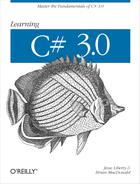You can access the members of an interface through an object of any class that implements the interface. For example, because Document implements IStorable, you can access the IStorable methods and property through any Document instance:
Document doc = new Document("Test Document");
doc.Status = -1;
doc.Read( );At times, though, you won’t know that you have a Document object; you’ll only know that you have objects that implement IStorable, for example, if you have an array of IStorable objects, as we mentioned earlier. You can create a reference of type IStorable, and assign that to each member in the array, accessing the IStorable methods and property. You cannot, however, access the Document-specific methods because all the compiler knows is that you have an IStorable, not a Document.
As we mentioned before, you cannot instantiate an interface directly; that is, you cannot write:
IStorable isDoc = new IStorable;
You can, however, create an instance of the implementing class and then assign that object to a reference to any of the interfaces it implements:
Document myDoc = new Document(…); IStorable myStorable = myDoc;
You can read this line as “assign the IStorable-implementing object myDoc to the IStorable reference myStorable.”
You are now free to use the IStorable reference to access the IStorable methods and properties of the document:
myStorable.Status = 0; myStorable.Read( );
Notice that the IStorable reference myStorable has access to the IStorable automatic property Status. However, myStorable would not have access to the Document’s private member variables, if it had any. The IStorable reference knows only about the IStorable interface, not about the Document’s internal members.
Thus far, you have assigned the Document object (myDoc) to an IStorable reference.
